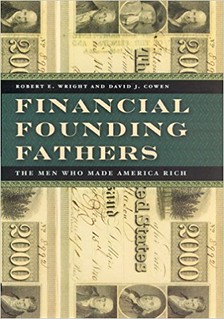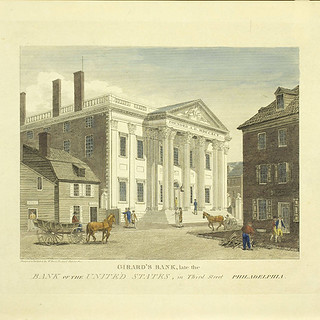
PREV ARTICLE
NEXT ARTICLE
FULL ISSUE
PREV FULL ISSUE
BOOK EXCERPT: FINANCIAL FOUNDING FATHERSPablo Hoffman forwarded this item from the Delancey Place blog, which excerpts passages from books. He writes, "The sub-text of this excerpt: the antagonism between the
entrenched and the progressive is eternal." -Editor
When America's Founding Fathers signed the Constitution in 1787, many believed that the new government was only authorized to do the functions specifically enumerated in that document. After all, those enumerated powers were already a bold leap forward from the Articles of Confederation. However, other signers felt that the government should be entitled to do things far beyond the enumerated powers, things "necessary and proper" to carry out its enumerated responsibilities. The difference between those two views formed an immediate rift between Alexander Hamilton and Thomas Jefferson that echoes to this day -- and first exploded in the battle over a bill to create the first Bank of the United States, an institution nowhere mentioned in the Constitution: "Banks were then highly controversial, but Alexander Hamilton was at the apex of his brilliance, guiding his Bank bill through Congress, ably aided by Congressman Fisher Ames of Massachusetts, a nationalist of the most fervent type. Although the Bank bill passed the Senate on January 20, 1791, congressman and Federalist Papers co-author James Madison tried to defeat it in the House. On February 8, the diminutive Madison and his allies lost a roll call that counted 39 in favor of the Bank and only 20 opposed. The political fighting had been particularly nasty, causing one senator to state in his diary that 'some gentlemen would have been ashamed to have their speeches of this day reflected in the newspapers of tomorrow.' The attack by the mostly southern opponents to the Bank was a landmark in American history, marking as it did the birth of the agrarian or Jeffersonian wing of the Republican Party. While this stand was the agrarian Republicans' first, it was certainly not their last; they would not rest in their attempt to destroy the creative work of Hamilton and his funding system.
To read the complete article, see:
Wayne Homren, Editor The Numismatic Bibliomania Society is a non-profit organization promoting numismatic literature. See our web site at coinbooks.org. To submit items for publication in The E-Sylum, write to the Editor at this address: whomren@gmail.com To subscribe go to: https://my.binhost.com/lists/listinfo/esylum All Rights Reserved. NBS Home Page Contact the NBS webmaster 
|

